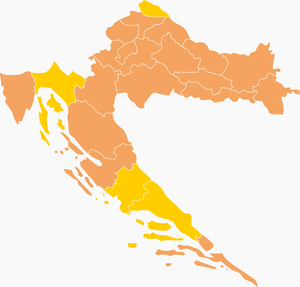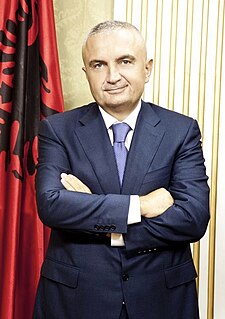
The President of Albania, officially styled the President of the Republic of Albania, is the head of state, commander-in-chief of the military and the representative of the unity of the Albanian people.

The President of Croatia, officially styled the President of the Republic, is the head of state, commander in-chief of the military and chief representative of the Republic of Croatia both within the country and abroad. The President is the holder of the highest office within the Croatia's order of precedence, however, the president is not the head of the executive branch as Croatia has a parliamentary system in which the holder of the post of Prime Minister is the most powerful person within the country's constitutional framework and within everyday's politics.

Presidential elections were held in Croatia for the first time on 2 August 1992 alongside simultaneous parliamentary elections. The result was a victory for incumbent Franjo Tuđman of the Croatian Democratic Union (HDZ), who received 57.8% of the vote, becoming the first popularly elected president of Croatia. Voter turnout was 74.9%.

Presidential elections were held in Croatia on 15 June 1997. They were the second presidential elections held since independence in 1991. The result was a victory for incumbent president Franjo Tuđman, the leader of the Croatian Democratic Union party (HDZ), who received 61.40% of the vote and was re-elected to a second five year term. As Tuđman received a majority of the valid votes cast on election day there was no need for a run-off. President Tuđman received a plurality of the votes in 20 of Croatia's 21 counties, while Vlado Gotovac did so in Istria County.
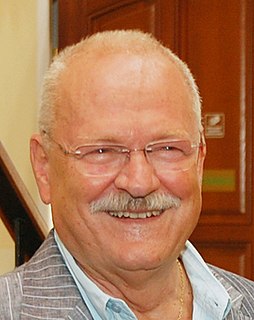
Presidential elections were held in Slovakia on 3 April 2004, with a second round on 17 April. Although former Prime Minister Vladimír Mečiar received the most votes in the first round, he was defeated by Ivan Gašparovič in the run-off.
Regular elections in Croatia are mandated by the Constitution and legislation enacted by Parliament. The presidency, Parliament, county prefects and assemblies, city and town mayors, and city and municipal councils are all elective offices. Since 1990, five presidential elections have been held. During the same period, nine parliamentary elections were also held. In addition, there were six nationwide local elections. Croatia has held two elections to elect 11 members of the European Parliament following its accession to the EU on 1 July 2013.

Presidential elections were held in Croatia in January 2005, the fourth such elections since independence in 1991. They were the first presidential elections held after the constitutional changes of November 2000, which replaced a semi-presidential system with an incomplete parliamentary system, greatly reducing the powers of the President in favor of the Prime Minister and their cabinet. Incumbent president Stjepan Mesić, who had been elected in 2000 as the candidate of the Croatian People's Party, was eligible to seek reelection to a second term and ran as an independent as the constitution prohibits the President from holding party membership while in office.

Presidential elections were held in Slovakia on 15 May 1999, with a second round on 29 May. Following a constitutional amendment in 1998 that introduced direct presidential elections for the first time, they resulted in a victory for Rudolf Schuster, who received 57.2% of the vote in the run-off.

Parliamentary elections were held in Croatia on 25 November 2007 and for overseas voters on 24 and 25 November. The campaign officially started on 3 November. The President of Croatia announced elections on 17 October and 14 days were allowed for candidate lists to be submitted.
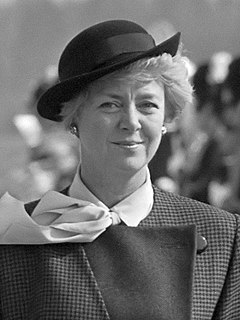
Presidential elections were held in Iceland on 25 June 1988. The result was a victory for the incumbent president Vigdís Finnbogadóttir, who received 94.6% of the vote. The election marked the first time a sitting president was challenged in an election.

General elections were held in Yugoslavia on 24 September 2000. In the presidential election, official results initially showed Vojislav Koštunica of the Democratic Opposition led incumbent Slobodan Milošević of the Socialist Party of Serbia in the first round of voting, but short of the 50.01 percent needed to avoid a runoff election. However, Koštunica claimed he was not only ahead, but had finished just a few thousand votes over the threshold to win a first-round victory. Spontaneous protests broke out in support of Koštunica, and Milošević was forced to resign on 7 October and concede the presidency to Koštunica. Revised totals were subsequently released showing Koštunica had indeed won a narrow first-round victory, with just over 50.2 percent of the vote.

Presidential elections were held in Moldova on 17 November 1996, with a second round on 1 December. Whilst incumbent President Mircea Snegur received the most votes in the first round, he was defeated in the second by Petru Lucinschi.

Presidential elections were held in Finland on 16 January 2000, with a second round on 6 February.
The following lists events that happened during 2000 in Croatia.
General elections were held in Bosnia and Herzegovina on 18 November 1990, with a second round of voting in the House of Peoples elections on 2 December. These were the final general elections to be held in Bosnia and Herzegovina while it was still a constituent republic of the Socialist Federal Republic of Yugoslavia.

Direct presidential elections were held for the first time in Bulgaria on 12 January 1992, with a second round on 19 January. The result was a victory for incumbent President Zhelyu Zhelev of the Union of Democratic Forces, who won 52.8% of the vote in the second round. Voter turnout was 75.4% in the first round and 75.9% in the second. Zhelev had originally been elected as President by the Grand National Assembly in 1990.
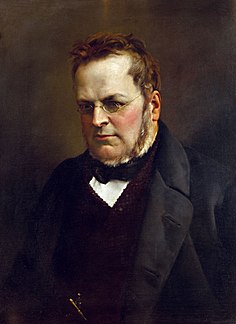
General elections were held in Italy on 27 January 1861, with a second round on 3 February. The newly elected Parliament first convened in Turin on 4 March 1861, where, thirteen days later, it declared the unification of the country as the Kingdom of Italy.

General elections were held in Macedonia on 16 October 1994 to elect a President and Assembly, with a second round of Assembly elections on 30 October. The presidential election was won by Kiro Gligorov of the Alliance for Macedonia, whilst the parties forming Alliance for Macedonia also won the Assembly elections with 95 of the 120 seats. However, the second round of the Assembly elections were boycotted by VMRO-DPMNE and the Democratic Party, as they claimed there had been irregularities in the first round.

Parliamentary elections were held in the Socialist Republic of Macedonia on 11 November 1990, with a second round on 25 November. They were the first competitive elections in the country's history. VMRO-DPMNE emerged as the largest party, winning 38 of the 120 seats.






